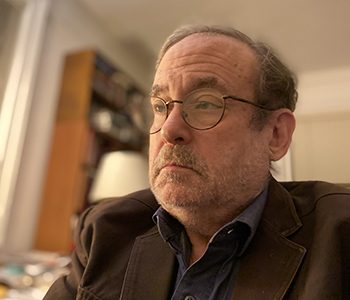In April 2024 Fathom published an interview with Mitchell Cohen entitled ‘From Stalin to Hamas: The Return of the Left that doesn’t Learn.’ The Austrian journal Zwischenwelten (Intermediate Worlds), published by the Theodor Kamer Gesellschaft in Vienna, is providing its readers with a German version and its translator, Richard Schuberth, posed additional questions to Cohen. One regards Omri Boehm’s book Haifa Republic: A Democratic Future for Israel, which calls for a ‘One-State Solution’ and the other asks about the distinction between left antisemitism and sharp criticism of Israeli policy. We are delighted to carry his answers. Cohen was the co-editor of the democratic left journal Dissent from 1991 to 2009 and is professor emeritus of political science at Bernard Baruch College of the City University of New York. His books include Zion and State: Nation, Class, and the Shaping of Modern Israel and The Politics of Opera.
Question: The Israeli philosopher Omri Boehm, in his book Haifa Republic, preaches the necessity of a one-state solution. Is this a publicity-grabbing utopia, a dangerous delusion or a real possibility for the distant future?
Mitchell Cohen: A “one-state solution” is an old idea. It has reappeared over decades with different seasonings. Flavors, however, need contexts. Without situating them historically, it is impossible to distinguish a novel means with which to address the Israeli-Palestinian tragedy from dated, failed recipes.
Proposals for a binational or federal but one-state Palestine were advanced before Israeli independence, mainly by left-wing Zionists and scorned by almost all Palestinian nationalists. In at least one case, in 1946, a Palestinian labor activist who responded positively was assassinated by nationalists. After the 1948-49 war the notion of a “democratic secular state in all of Palestine” was promoted mostly by opponents of a Jewish state. It was not designed by advocates of democracy or secularism to promote either of those ideas, but by Palestinian nationalists and erstwhile Leninists to appeal to Western intellectuals, especially on the left.
Some of those intellectuals were keen to straightjacket discussion of the Israeli-Palestinian conflict with notions of “settler-colonialism” and imperialism. Absent was serious consideration of how persecution of Jews led to Zionism. Instead came an old refrain: world revolution would solve “the Jewish question” along with all other questions. The flaw was similar to one pointed out by feminists in recent decades, and was articulated by Simone de Beauvoir in The Second Sex when she dissected some assumptions of Friedrich Engels’s book on The Origins of the Family, Private Property and the State. She thought that all sources of domination could not be reduced to economics. However valuable, Marxist claims about class led awry when they led to the conclusion that a classless society would by definition – presto! — dissolve all sources of injustice. The circumstances of women had to be tackled in their specificity. Likewise, left-wing Zionists challenged beliefs that the “Jewish problem” and anti-Semitism would – presto! – dissolve in internationalism. The arguments of de Beauvoir and the left-wing Zionists interrogated what I’d call “A Will to Abstract Universalism.”
What can a “one-state solution” mean today? Hamas wants one state, an Islamic one from “the river to the sea,” or more precisely an Islamist Palestine that is part of an Islamist Middle East. Its commitments are neither secular nor democratic. Deaths of Palestinian civilians along the divine path are acceptable to Hamas as collateral damage, although it is helpful if someone else can be blamed for, say, using innocents as shields. Netanyahu and his Likud party, together with integral religious nationalists in his government like Bezalel Smotrich or Itamar Ben-Gvir, are also for a one-state solution, just a Jewish one. Hamas’s “one state” is based on religious dogma whose adherents believe must be universalized. The Likud’s ultra-nationalist worldview is particularistic in its dogma. Neither set of believers has any sense of tragedy, just resentments derived from their own side’s historical sufferings. If the content of their zeal differs, there is a commonality in mental form.
Otherwise, they would have to recognize rights and wrongs on both sides – and that always requires understanding of historical contexts. Intellectuals have a special responsibility to use history and ethics to make distinctions and appreciate dissimilarities. Boehm’s polemic, The Haifa Republic (2021), fails to do just that. It exemplifies the problem of a “left that doesn’t learn.”
He insists on the importance of historical memory but equates “Shoah” with “Nakba.” This is counterfeit moral symmetry. The “Shoah” – the “Holocaust” – was industrialized extermination based on a racist ideology imbued with conspiracy theory. It came after a much longer history of European Jew-hatred to which Zionism responded. Think of what Ben-Gurion, leader of Mapai (the Israel Workers’ Party), would have found looking back at the decade before he read Israel’s “Declaration of Independence” in 1948. Hitler’s considerable success at genocide. Palestinian leaders cheering it in Berlin during the war. Declarations by leaders of the Arab League in 1947 that a Jewish state would be razed. British support for the Arab side in the ensuing war.
“Nakba” means disaster in Arabic. It was introduced in The Meaning of the Disaster, published in mid-1948 by Constantin Zurayk, a Damascus-born pan-Arabist. The 1956 English translation by a friend of his at Princeton’s Department of Oriental Languages was supplemented by other Zurayk statements from 1947 and 1948. “Seven Arab states declare war…” he wrote, “and…turn on their heels,” having made “fiery speeches…” Arab disunity prevented “subduing” Zionism – that was, first of all, the “disaster” for him. “Nakba” eventually became a surrogate term for what befell 700,000 Palestinians who became refugees. Arguments linger, sometimes in good and sometimes in bad faith, about the numbers and causes of their misfortune. But only morally false equivalence or propaganda-minded rhetoric makes an indisputable calamity, which resulted from a war initiated by their champions, into the same thing as genocide. Some 156,000 Palestinian Arabs remained in Israel after the war as citizens. Moral seriousness dissolves in the assimilation of “Nakba” into “Shoah.” It raises questions about other assertions made by a proponent of it. Zurayk’s booklet is littered with anti-Semitic conspiracy theory.
Don’t liberal or “left” advocates of a “one-state solution” often do something uncomfortably comparable to Hamas and the Likud when they impose their own prescriptions in the guise of abstract, supposedly universalistic principles? Aren’t they insisting on their own, blindly inflexible standard – one very different, to be sure, from Hamas’s religious zeal and Likud’s ultra-nationalism – that is finally numb to consequences? Theodor Adorno was right to contend – in another context, of course – that concepts need to be functions of their objects, not the other way around.
A “one-state solution” is better named “the Civil War Solution” – one between Jews and Palestinians — because that would be the outcome. That is no way out and there is nothing in memory that indicates any other, plausible result. Suffering this past year by Israelis and Palestinians only reinforces such an appraisal.
Boehm’s one state is not that of Hamas or Likud; it is a return in to the futile, pre-1948 binational-federalism idea. It is like declaring, “From the river to the sea, Palestine will be democratic,” but with a dystopian sense of democracy. His account is accompanied by an intellectual history of Zionism that relies on selective, de-contexualized readings of texts and statements.
His epigraph comes from Herzl: “If you will it, it is no dream.” But Boehm’s purpose seems to be an epitaph for the idea of a democratic Jewish state through a will to “democratic binationalism.” He admits it may be a “dream,” but his often sectarian rhetoric should serve as a warning. He dismisses brusquely views opposed to his own as unrealistic “illusion.” He derides the late Amos Oz for “reactionary obfuscation.” Why? Because this Israeli writer, a dove who supported what Boehm calls “the two-state lie,” called for inventiveness rather than resignation to counter the notion that the incorporation into Israel of the West Bank is irreversible.
Boehm’s “republic” would include Israel, the West Bank, and Gaza. But why not a step-by-step process to create a West Bank-Gaza-Jordan confederation next to a democratic Jewish state committed to minority rights? This course could be coupled to an Israeli exit from the West Bank, its demilitarization, and land swaps.
It might be contended that Palestinians don’t want such a Palestinian-Jordanian confederation. That may be so, but then most Israeli Jews don’t – and will never — want what Boehm wants.
In a 1934, just after defeating Jabotinsky’s rightwing in Zionist politics – it had demanded that Zionists declare their “final aim” (“endziel”) to be a Jewish state on both sides of the Jordan river — and just when Jewish flight into Palestine pressed urgently due to Hitler, Ben-Gurion proposed to Arab nationalists that they work jointly for an independent Jewish state with open immigration in league with an independent federation of Arab states. The Arab minority within a Jewish state would then still be part of a majority throughout the region.
The idea was rejected. Remarkably, Ben-Gurion expressed understanding why: Arab “patriots,” he said, didn’t want Arabs to become a minority in Palestine. In any event, history was about to overwhelm both sides.
An updated imagination might submit a formula somewhat similar to Ben-Gurion’s, adding that a). the Jewish majority and the Arab minority would have suffrage as citizens in a Jewish state (as they both have now); b). Jewish citizens would maintain bonds with Jews around the world (who don’t and shouldn’t have the vote in Israel); c). Arab citizens could maintain special bonds with Palestinians elsewhere, including those living in a neighboring Palestinian state, should one arise – they would not be able to vote in it if it was democratic – along with Arabs throughout the Mideast.
Boehm, writing in 2021, salutes the “Joint List,” a coalition of anti-Zionist or non-Zionist parties based mostly in Israel’s Arab sector, although he was forced finally to admit that it became “isolated” in Israel’s political life. He is anxious to insist that that a Jewish state cannot be democratic but doesn’t deploy his own standards to this List’s components. One, Balad, defines itself as a “Palestinian Arab Nationalist Party” (Miflagah Leumit Aravit Palestinit) while embracing a “democratic secular state.” A second, Hadash, is the reinvented Communist party with added allies. It supports the two-state solution. The third, Ta’al, a self-proclaimed secular-nationalist party, does too. The fourth, Ra’am, is Islamist — Israeli Islamists divide between those who accept an Israeli state framework and those who don’t – and became part of the short-lived governing coalition of prime minister Naphtali Bennet. The Joint List dissolved just before the 2022 elections. Hadash, in the meantime, refuses to condemn Russia’s invasion of Ukraine and blames the US and NATO for Putin’s imperialism, echoing leftwing sectarians elsewhere. Should this stance tell us anything about its other positions?
Advocacy of one-state “democratic” solutions reminds me of an argument made with very different references (which I’ll simplify). Hegel once asserted the need to ask if artworks cultivate judicious judgments or merely entertain. Take opera. A text set to music, he thought, should have substance and provide a composer’s imagination its scope for artistic inventiveness: “The chief thing to be demanded of a good libretto is that its contents shall have … true solidity.” Alluring melody can render it “less decisive,” but music would still “crave” words with “some real meaning.” Musical “profundity” could not be “conjured” from “trumpery” since a composer “can add what seasoning and spices he likes, but a roasted cat will never make a hare-pie.” This allusion was to Goethe’s fable of a chef who wants also to be a hunter but shoots a cat instead of a rabbit. He tries to dodge his problem by setting it “before the company, dressed with plenty of ingenious herbs.” Yet on eating, it is still a cat.
What if nobody wants to eat the cat being served up? That is certainly the case with “one-state solutions.”
But prospects for two-states are certainly not robust. I see no hopeful prospects for any “solution” right now.
Here I think an old leftwing argument is of some heuristic value. The left used to engage in seemingly interminable rows about whether or not there were preconditions for the creation of a classless society.
There was more to them than is sometimes admitted. Those who thought these debates only hot air, to be blown aside by revolutionary will, usually brought ruin.
The same is so for demands for comprehensive solutions to the Israeli-Palestinian struggle. Better to suspend talk about final goals – including Palestinian demands for statehood and Israel’s for real security – and to pursue preconditions for a better reality, separating the antagonists step by step and then pushing beyond that. Each move should make it increasingly expensive and difficult to go back.
All this requires a kind of leadership that is now absent on both Israeli and Palestinian sides. Even if it emerged, it would easily be jeopardized by Iran or Hizballah or by malevolent Israeli and Palestinian actors. Nothing would be as easy as a formula, but a step by step alternative would depend on inventive imagination.
Question: The epithet ‘anti-Semite’ is often hurled at people on the left who express solidarity with the Palestinians. Where distinguishes people with selective historical education and a consequent one-sided partisanship from leftists informed, consciously or not, with anti-Semitism? To what extent is factual enlightenment and discussion possible and necessary?
Mitchell Cohen: The effort is always necessary, although success depends a great deal on who is trying to enlighten and who he or she is trying to enlighten. There has to be some common language and good will. I don’t think that anyone who criticizes Israeli policies – I do — or Zionism is necessarily anti-Semitic. But something else is going on when someone repeats old canards, consciously or not, in the guise of anti-Zionism. These are accompanied often by assertions — sometimes through dark hints and sometimes in strained voice — that everything would be otherwise had “the Zionists” not controlled the media or the banks or whatever.
I admit to vexation at those within the left who believe that their own views would have taken hold everywhere were it not for the manipulations of stealth networks. This mindset has an anti-democratic thrust: fellow citizens who don’t concur with you are necessarily stage-managed idiots. I don’t find this posture so different from conspiracy mongers in, say, Donald Trump’s world or, in a European context, that of Victor Orban and his chums, with their prattle about George Soros. Records may be different even if the record player is the same, as George Orwell observed (the principle still applies in our digital age).
I feel solidarity with Palestinians who want to be free of occupation and want an end to their people’s suffering. But I feel no solidarity with Palestinians or smug advocates of “the Palestine cause” – they are like a contemporary intellectual Comintern — whose real purpose is to discredit the idea of a Jewish state with philosophical fibs about democracy, imperialism, and history. That gets extended to “resistance.”
I feel solidarity with Israelis who see Zionism as the intelligent political response to the relentlessly precarious, painful and ghastly history of the Jews, and who want to secure for fellow citizens, Jewish and non-Jewish, safe, fruitful lives. I feel no solidarity with zealots, believers in integral or religious nationalism or their purported friends abroad, who champion everlasting Israeli possession of the territories taken in the 1967 war. The legitimacy of Zionism – or, to be precise, some Zionisms – rests on liberation of people, not an inevitably corrosive occupation of others.



































